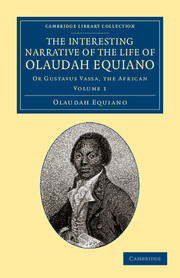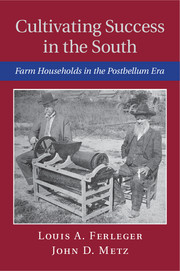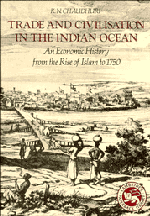Refine search
Actions for selected content:
26946 results in Economic history
Bonin Hubert: French Banks and the Greek ‘Niche Market’ mid-1880s–1950s (Geneva: Librairie Droz, 2013)
-
- Journal:
- Financial History Review / Volume 21 / Issue 2 / August 2014
- Published online by Cambridge University Press:
- 19 August 2014, pp. 218-220
-
- Article
- Export citation
Shizuya Nishimura, Toshio Suzuki and Ranald C. Michie, The Origins of International Banking in Asia: The Nineteenth and Twentieth Centuries (Oxford: Oxford University Press, 2012, 264 pp., ISBN 978-0-19-964632-6)
-
- Journal:
- Financial History Review / Volume 21 / Issue 2 / August 2014
- Published online by Cambridge University Press:
- 19 August 2014, pp. 220-223
-
- Article
- Export citation
FHR volume 21 issue 2 Cover and Front matter
-
- Journal:
- Financial History Review / Volume 21 / Issue 2 / August 2014
- Published online by Cambridge University Press:
- 19 August 2014, pp. f1-f3
-
- Article
-
- You have access
- Export citation
FHR volume 21 issue 2 Cover and Back matter
-
- Journal:
- Financial History Review / Volume 21 / Issue 2 / August 2014
- Published online by Cambridge University Press:
- 19 August 2014, pp. b1-b4
-
- Article
-
- You have access
- Export citation
Kazuhiko Yago, The Financial History of the Bank for International Settlements, Routledge Studies in the Modern World Economy (London: Routledge, 2013, 240 pp.; ISBN 978-0-415-63524-0)
-
- Journal:
- Financial History Review / Volume 21 / Issue 2 / August 2014
- Published online by Cambridge University Press:
- 19 August 2014, pp. 213-215
-
- Article
- Export citation
Peter Temin and Hans-Joachim Voth, Prometheus Shackled: Goldsmith Banks and England's Financial Revolution after 1700 (Oxford: Oxford University Press, 2013, 224 pp., ISBN 978-0-19-994427-9, £25.99)
-
- Journal:
- Financial History Review / Volume 21 / Issue 2 / August 2014
- Published online by Cambridge University Press:
- 19 August 2014, pp. 215-218
-
- Article
- Export citation

The Interesting Narrative of the Life of Olaudah Equiano
- Or Gustavus Vassa, the African
-
- Published online:
- 05 August 2014
- Print publication:
- 06 June 2013
- First published in:
- 1789

Cultivating Success in the South
- Farm Households in the Postbellum Era
-
- Published online:
- 05 August 2014
- Print publication:
- 28 July 2014

Trade and Civilisation in the Indian Ocean
- An Economic History from the Rise of Islam to 1750
-
- Published online:
- 05 August 2014
- Print publication:
- 07 March 1985
INSIDE THE DYNAMICS OF INDUSTRIAL CAPITALISM: THE MASS PRODUCTION OF CARS IN SPAIN, 1950-1985*
-
- Journal:
- Revista de Historia Economica - Journal of Iberian and Latin American Economic History / Volume 32 / Issue 2 / September 2014
- Published online by Cambridge University Press:
- 30 July 2014, pp. 287-315
- Print publication:
- September 2014
-
- Article
- Export citation
Introduction
-
- Book:
- Cultivating Success in the South
- Published online:
- 05 August 2014
- Print publication:
- 28 July 2014, pp 1-11
-
- Chapter
- Export citation
Conclusion
-
- Book:
- Cultivating Success in the South
- Published online:
- 05 August 2014
- Print publication:
- 28 July 2014, pp 171-180
-
- Chapter
- Export citation
Index
-
- Book:
- Cultivating Success in the South
- Published online:
- 05 August 2014
- Print publication:
- 28 July 2014, pp 197-206
-
- Chapter
- Export citation
Series page
-
- Book:
- Cultivating Success in the South
- Published online:
- 05 August 2014
- Print publication:
- 28 July 2014, pp iii-iv
-
- Chapter
- Export citation
Cultivating Success in the South - Half title page
-
- Book:
- Cultivating Success in the South
- Published online:
- 05 August 2014
- Print publication:
- 28 July 2014, pp i-ii
-
- Chapter
- Export citation
Dedication
-
- Book:
- Cultivating Success in the South
- Published online:
- 05 August 2014
- Print publication:
- 28 July 2014, pp vii-viii
-
- Chapter
- Export citation
Was the Gibson Paradox for real? A Wicksellian study of the relationship between interest rates and prices
-
- Journal:
- Financial History Review / Volume 21 / Issue 2 / August 2014
- Published online by Cambridge University Press:
- 28 July 2014, pp. 139-163
-
- Article
- Export citation
Abbreviations
-
- Book:
- Cultivating Success in the South
- Published online:
- 05 August 2014
- Print publication:
- 28 July 2014, pp xiii-xiv
-
- Chapter
- Export citation
Bibliography
-
- Book:
- Cultivating Success in the South
- Published online:
- 05 August 2014
- Print publication:
- 28 July 2014, pp 181-196
-
- Chapter
- Export citation
3 - Production in the Piedmont
-
- Book:
- Cultivating Success in the South
- Published online:
- 05 August 2014
- Print publication:
- 28 July 2014, pp 57-91
-
- Chapter
- Export citation
